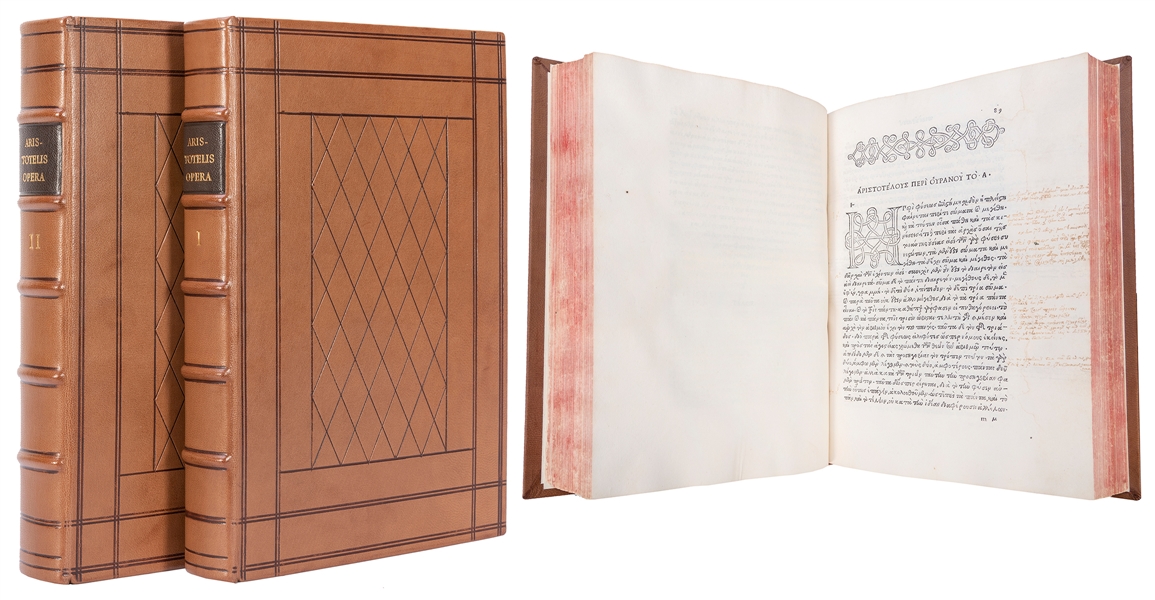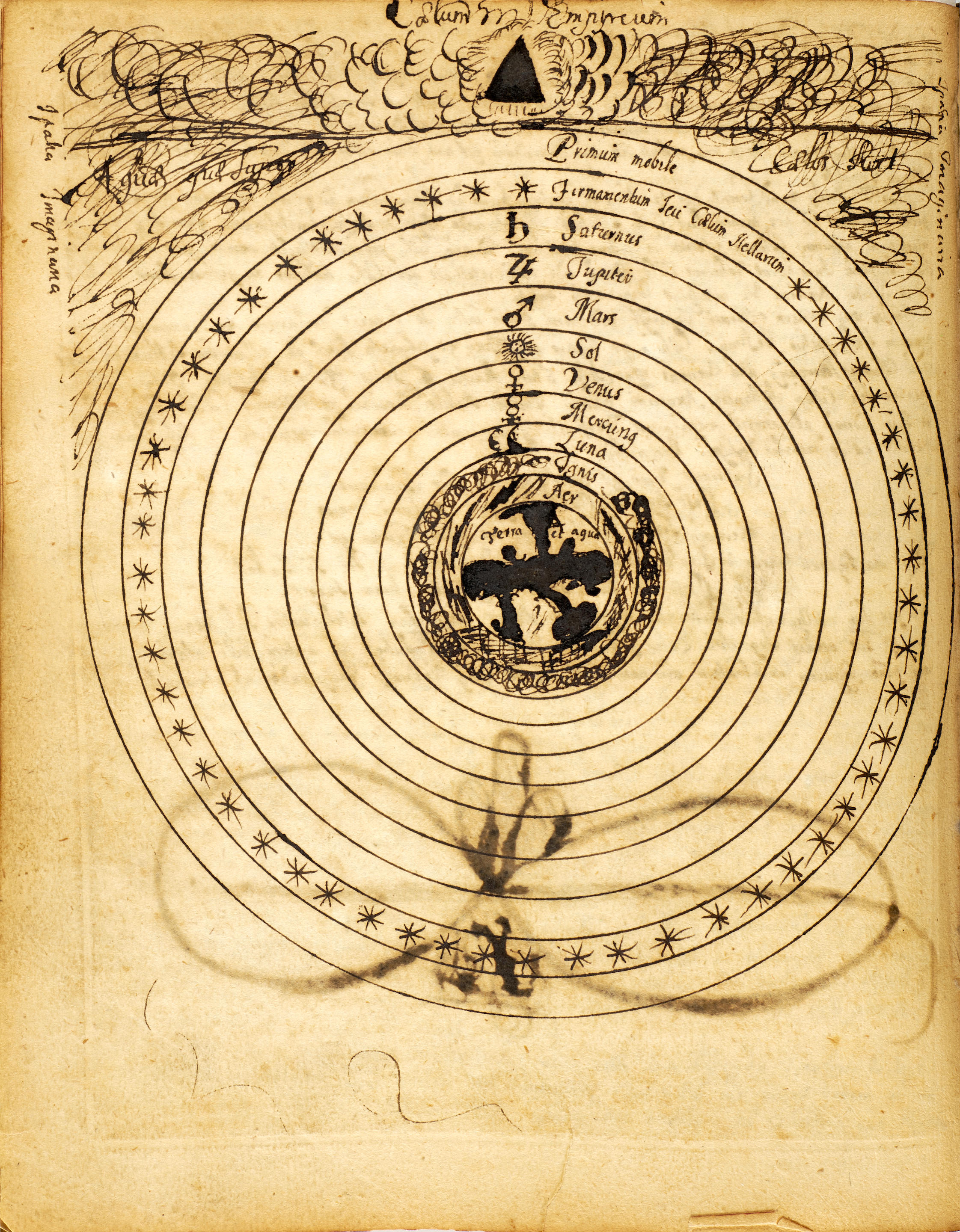ARISTOTLE (c.384-c.322 B.C.), Categoriae ; Liber sex principiorum ; ARISTOTLE, Liber Peri hermenias ; BOETHIUS, Anicius Manlius Severinus (c.476-524), Liber de divisione , De differentiis topicis , in Latin, DECORATED MANUSCRIPT ON VELLUM [France, mid-13th century] 175 x 115mm. 81 leaves: 1 1 0, 2 1 1(ix a contemporary inserted part-folio), 3-8 1 0, lacking at least one leaf before opening including first 14 lines of text, catchwords towards the centre of final versos of gatherings 1-5 and towards gutter of 6-7, signature marks of red symbols with numbering strokes survive in the lower margins of the first half of several gatherings, 24-28 lines written in black ink in a small gothic semi-cursive bookhand between two verticals and 25-29 horizontals ruled in plummet, justification: 102 x 55mm, paragraph marks of red, text capitals touched red ff.1-53, one- to four-line initials of red or blue flourished with the other colour, six marginal diagrammatic tables, five with decorative framing in red, extensive marginal annotations (a few wormholes in first and last six leaves, small losses from lower margin of folio 2, several leaves with original vellum flaws). Modern wooden boards with two leather straps with old brass clasps and pin. PROVENANCE: 1. Both content and appearance suggest that this manuscript was produced in northern France, perhaps in Paris, for the use of a student or teacher at the University. It is carefully and extensively corrected and annotated. 2. Jesuits of Millstatt, Austria: erased inscription at top of f.1. In 1598 the Jesuits were granted the house of the military Order of St George in Millstatt. Originally a Benedictine house, founded in 1088, it had been given to the Order in 1469. The Jesuits were suppressed in 1773 and their considerable Millstatt Library was one of the founding collections of the Studienbibliothek in Klagenfurt, now the Universitätsbibliothek. Nearly all their manuscripts had come from the Benedictines. CONTENT: Aristotle, Categoriae , lacking opening 14 lines ff.1-20v ( Aristoteles Latinus , i. 1-2, Bruges etc 1961); Anonymous, Liber Sex Principiorum ff.20v-30 ( AL , i. 7, Bruges etc, 1966); Aristotle, Liber Peri hermenias ff.30-41 ( AL , ii. 1, Bruges etc, 1965); Boethius, Liber de divisione ff.41v-53 ( PL , 64, 793-832); Boethius, De differentiis topicis ff.53v-81v ( PL , 64, 1173-1216). These works were all part of what became known as the logica vetus -- the corpus of philosphical logic largely reliant on Boethius's own compositions and his translations of both Aristotle's logical treatises and Porphyry's introduction to Aristotle. Until the middle of the 12th century, and the recovery of 'new' translations, these were the most widespread means through which Aristotle's teachings were known, and they served as the basis of philosphical education throughout Europe, influencing method and discussion in almost every discipline. The only text included here that is not the work of Boethius is the Liber sex principiorum , a mid-12th-century text of unknown authorship on the last six Aristotelian Categories . This, wrongly attributed to Gilbert de la Porrée from the middle of the 13th century, joined the logica vetus among the texts stipulated for study in 13th-century university statutes. It has been pointed out that the fortune of the logic texts is directly related to the foundation and development of the universities, and this manuscript has every appearance of being a 13th-century schoolbook.
ARISTOTLE (c.384-c.322 B.C.), Categoriae ; Liber sex principiorum ; ARISTOTLE, Liber Peri hermenias ; BOETHIUS, Anicius Manlius Severinus (c.476-524), Liber de divisione , De differentiis topicis , in Latin, DECORATED MANUSCRIPT ON VELLUM [France, mid-13th century] 175 x 115mm. 81 leaves: 1 1 0, 2 1 1(ix a contemporary inserted part-folio), 3-8 1 0, lacking at least one leaf before opening including first 14 lines of text, catchwords towards the centre of final versos of gatherings 1-5 and towards gutter of 6-7, signature marks of red symbols with numbering strokes survive in the lower margins of the first half of several gatherings, 24-28 lines written in black ink in a small gothic semi-cursive bookhand between two verticals and 25-29 horizontals ruled in plummet, justification: 102 x 55mm, paragraph marks of red, text capitals touched red ff.1-53, one- to four-line initials of red or blue flourished with the other colour, six marginal diagrammatic tables, five with decorative framing in red, extensive marginal annotations (a few wormholes in first and last six leaves, small losses from lower margin of folio 2, several leaves with original vellum flaws). Modern wooden boards with two leather straps with old brass clasps and pin. PROVENANCE: 1. Both content and appearance suggest that this manuscript was produced in northern France, perhaps in Paris, for the use of a student or teacher at the University. It is carefully and extensively corrected and annotated. 2. Jesuits of Millstatt, Austria: erased inscription at top of f.1. In 1598 the Jesuits were granted the house of the military Order of St George in Millstatt. Originally a Benedictine house, founded in 1088, it had been given to the Order in 1469. The Jesuits were suppressed in 1773 and their considerable Millstatt Library was one of the founding collections of the Studienbibliothek in Klagenfurt, now the Universitätsbibliothek. Nearly all their manuscripts had come from the Benedictines. CONTENT: Aristotle, Categoriae , lacking opening 14 lines ff.1-20v ( Aristoteles Latinus , i. 1-2, Bruges etc 1961); Anonymous, Liber Sex Principiorum ff.20v-30 ( AL , i. 7, Bruges etc, 1966); Aristotle, Liber Peri hermenias ff.30-41 ( AL , ii. 1, Bruges etc, 1965); Boethius, Liber de divisione ff.41v-53 ( PL , 64, 793-832); Boethius, De differentiis topicis ff.53v-81v ( PL , 64, 1173-1216). These works were all part of what became known as the logica vetus -- the corpus of philosphical logic largely reliant on Boethius's own compositions and his translations of both Aristotle's logical treatises and Porphyry's introduction to Aristotle. Until the middle of the 12th century, and the recovery of 'new' translations, these were the most widespread means through which Aristotle's teachings were known, and they served as the basis of philosphical education throughout Europe, influencing method and discussion in almost every discipline. The only text included here that is not the work of Boethius is the Liber sex principiorum , a mid-12th-century text of unknown authorship on the last six Aristotelian Categories . This, wrongly attributed to Gilbert de la Porrée from the middle of the 13th century, joined the logica vetus among the texts stipulated for study in 13th-century university statutes. It has been pointed out that the fortune of the logic texts is directly related to the foundation and development of the universities, and this manuscript has every appearance of being a 13th-century schoolbook.








.jpg)






Testen Sie LotSearch und seine Premium-Features 7 Tage - ohne Kosten!
Lassen Sie sich automatisch über neue Objekte in kommenden Auktionen benachrichtigen.
Suchauftrag anlegen